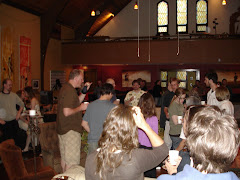There’s a tiny island nation only a few hundred miles from our southern border that couldn’t be further away. It’s a mountainous island…mountains as far as the eye can see… "Mountains beyond mountains” as author Tracy Kidder puts it.
It’s a land of beautiful simplicity…where one can easily imagine what life was like for everyone in the days before electricity, technology, and mass transit.
In Haiti, people can’t even imagine the things that we can’t imagine doing without: basic machinery, computers, desks, I-pods, or even matching shoes. There are no bathrooms or toilets in most of Haiti, not at school, not in stores or at public places, not even in homes - and that includes outhouses.
Only a few Haitians have cars or anything in which to carry their burdens. Haiti doesn’t even have the capacity to collect or deal with its own trash, and so the streets there are lined with garbage and filth. When a hard rain falls, the garbage flows through the streets like a river, leading all the way to the ocean.
Few if any of the roads in Haiti are paved, and if you ask a Haitian, “Which side of the road do you drive on in Haiti?” she will answer, “Which ever side has the least holes.”
When folks read about Haiti’s 80-90% unemployment rate, they picture a sedentary people, a lot of standing around. But nothing could be further from the truth. Haiti is a blur of energetic motion. In this land without welfare or any sort of social safety net, everyone is busy all day long, searching for water, scavenging for food, trying to make their own charcoal, seeking to make anything that they might be able to sell. Here in America, we recycle for the environment or to be politically correct. In Haiti they recycle to survive. Old newspapers become a blanket, discarded hubcaps become wok, and old tires becomes a garden liner.
But for those with the eyes and the hearts to see through and beyond the trash, a beautiful nation of people resides in Haiti – creative people, faithful people, hardworking people, hopeful people, and even playful people. The children of Haiti are all curious and eager to learn, but only the luckiest few get to go to school, for there is no public education in Haiti. Only those whose parents can pay 2-400 dollars a year get the benefit of schooling.
For those of us who visit this land of contradictions, two questions always seem to rise above all the rest. First, what is it that enables folks who have so little, who have all the odds stacked against theme, to carry on with such dignity, hope, faith, and joy? And the second, of course, is why? Why has so much hardship come to this one people, this tiny island nation and why NOT to us?
As for the first question - how can Haitians be so hopeful and joyful? - at least part of the answer lies with the countless people who are lending a hand in Haiti. I met folks both from Haiti and from other lands who are joining in the Haitian struggle, believing that God is alive and still at work, still creating, still restoring, still redeeming, believing that Jesus really does love the poor in a special way and makes good on his promise that they will be blessed.
As for the second question – why is Haiti so beleaguered and beset with such poverty and devastation? - I can offer no answer. All I can offer is a journal entry from one of my favorite theologians, Fredrich Buechner, reflecting on the haphazard way luck falls upon one and not another....
“The day I signed the contract for my first novel was a major event for me. Needless to say it was the fulfillment of my wildest dreams of literary glory. But of the actual signing itself in the offices of the publisher, I remember nothing. What I remember instead is leaving the publishers office afterwards and running into somebody I had known in college. He was working as a messenger boy, he told me. I was on the brink of fame and fortune. But instead of feeling any pride or sense of superior accomplishment by the comparison, I remember a great and unheralded rush of something like sadness, almost like shame. I had been very lucky, and he had not been very lucky, and the pleasure that I might have taken in what had happened to me was all but lost in the realization that nothing comparable, as far as I could see had happened to him. I wanted to say something or do something to make it up to him, but I had no idea how or what and ended up saying nothing of any consequence at all, least of all anything about the contract that I had just signed. We simply said goodbye in the lobby, he going his way and I mine, and that was that.
All I can say now is that something small but unforgettable happened inside me as a result of that chance meeting – some small flickering out of the truth that, in the long run, there can be no real joy for anybody until there is joy finally for us all…”
Sunday
Subscribe to:
Post Comments (Atom)
Eloise Anna Jones

A Reader at 8 months!
papa and Weezie

it doesn't get any better than this!


















No comments:
Post a Comment